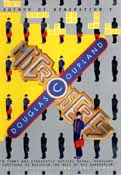Chris Mitchell emails Douglas Coupland about fame, the future and the problem with American chocolate
Douglas Coupland is not your average novelist. Since the publication of Generation X in 1991, he has become one of this decade’s most important writers, thanks to his unerring ability to capture the zeitgeist of young middle class America in the post-industrial  1990s. Where Generation X and Shampoo Planet dealt with the existential confusion of America’s over-educated children, Microserfs documented the movement of technology into mainstream culture. Each book seemed impossibly of the moment at their time of publication – many said Microserfs must have been speed-written in order to cash in on the advent of multimedia, yet in fact it was the result of three years’ painstaking research. While Coupland is usually portrayed as a “spokesman for a generation” and a technological evangelist (one of the short stories on Coupland’s website is entitled “The Past Sucks”), most accounts of his work fail to recognise its inherent humour and humanity.
1990s. Where Generation X and Shampoo Planet dealt with the existential confusion of America’s over-educated children, Microserfs documented the movement of technology into mainstream culture. Each book seemed impossibly of the moment at their time of publication – many said Microserfs must have been speed-written in order to cash in on the advent of multimedia, yet in fact it was the result of three years’ painstaking research. While Coupland is usually portrayed as a “spokesman for a generation” and a technological evangelist (one of the short stories on Coupland’s website is entitled “The Past Sucks”), most accounts of his work fail to recognise its inherent humour and humanity.
Now nearly 35 and finally settled in his home town of Vancouver, Coupland’s new book, Polaroids From The Dead, does something to redress the balance. Billed as a collection of “photos from the kitchen drawer”, Polaroids is a set of personal essays about moments of life – attending a Grateful Dead concert, an obituary for Kurt Cobain, a homage to James Rosenquist’s F1-11. The book’s closing essay, “Brentwood Notebooks”, takes a fascinating and chilling look at the nature of fame in the wake of the OJ Simpson trial.
With Polaroids From The Dead’s UK publication in November, SPIKE caught up with Doug via email. The following is the transcript of our conversation.

 Hi Spike (or is it Chris?)
Hi Spike (or is it Chris?)
I received your three postings. I know it’s strange when you accidentally post the wrong draft. It’s the modern equivalent of leaving your letter of resignation under the Xerox machine lid.
If your name is Spike, you’ll be the second one I know — which is statistically improbable. The other Spike is Spike Jonze, lately of MTV video fame, but before that of ‘Dirt’ fame — a short-lived US magazine for 18-25s. He and the staff came up to Vancouver for a day and a half to visit me as part of their ‘Discover America–a month on the road” issue. It was great fun, and then a few weeks later I was doing a reading at the University of Iowa and they were driving through and heckled me from the back and it was great fun. They’d just done this chocolate rating system on Canadian chocolate bars (essentially identical to England’s — Kit Kat, Aero… ) and they gave the bars really low ratings, which sucked because have you ever tried US chocolate? Hork! They had just come back from Devil’s Tower monument (Close Encounters of the Third Kind) where, after they finished a chocolate bar, they tossed it out to the prairie dogs. If the dogs ate it, the bar got an extra point. If they wouldn’t eat it, the bar lost a point.
I decided that I had to defend my nation’s chocolate’s honour, so I bought about 12 US bars at the Circle-K Mart and then we went to my hotel room and had a Tasting Session. I’d take a bite of a bar, make comments, spit it out into a waste  paper basket and take a drink of water and move on to the next bar. I described the ‘Three Musketeers’ bar as having a definite log-in-the-toilet aspect. They printed this in the chart in their magazine and the company that makes Three Musketeers bars went ballistic and pulled their ads and the magazine folded shortly thereafter. Whew! What a long story. So, hi.
paper basket and take a drink of water and move on to the next bar. I described the ‘Three Musketeers’ bar as having a definite log-in-the-toilet aspect. They printed this in the chart in their magazine and the company that makes Three Musketeers bars went ballistic and pulled their ads and the magazine folded shortly thereafter. Whew! What a long story. So, hi.
Americans are obsessed with putting peanut butter in virtually every chocolate bar – why? It smells like dog doo.
You have to watch it because Americans go nuts if you slander their chocolate. They really do. I guess it’s because it’s such a gratifying signal that goes in early and deep into the child’s mind.
I wasn’t quite sure about this email interview business. I had this vision of you sitting there with stock answers ready to paste in…
Not at all. That would be a fax interview (which this is not) or an interview with Duran Duran (or rather, their people). My large problem with interviews (and I do have many problems) is that my brain won’t allow me to do serial interviews. Once a question’s been asked, then my brain rebels against having to answer the same question again. This makes me appear grouchy. I’m hoping the WWW will allay some of this repetition. I’m always amazed at actors and how they can charmingly spew forth studio agendas. But then that’s what they do for a living — they’re actors.
Did you travel a lot when younger?
Probably to much. I lived in too many places in the 1980s (in no order: Vancouver, Toronto, Sapporo, Tokyo, Milan, Los Angeles, Montreal, Stuttgart).Then in my thirties I visited too many cities with work but was frustrated because I’d “be” in a city just aching to tour around, but instead I was stuck in a hotel room. I don’t know how sports teams don’t go mad travelling around as much as they do. I suppose it’s okay because they’ve plenty of company. 
I’m 24…
Oh, then you’re due for your mid-twenties crisis any day now. Beware… nobody escapes. Your 20s are muck and shit and pain and loneliness and horror.
I think I have a headline for this interview…
Indeed! I wish somebody had warned me. I might have changed a few things. (like what, Doug?) I wouldn’t have worried so much. And I would have quit smoking at 20 instead of 26, for starters.
Did you admire any writers at 24?
I read many writers but I never really admired written craftsmanship until around 28 or 29. I admired visual artists (all of the Pop artists) and the usual assortment of 1980s New Order/OMD performers.
And would you have wanted to have communicated with them?
Actually, no. I learned rather quickly in art school that someone’s personality is often a million miles away from their work. I’ve been lucky over the past few years and have met many people I’ve wondered about and it’s been good fun. But it’s always been accidental–never seeking out. For what it’s worth, I was driving up the coast yesterday listening to Phillip Glass’ Powaquaatsi, the sequel to Koyanisquaatsi… are you familiar with them? Wonderful movies both. I met the director by chance in New Mexico and I told him how much I liked them and he snarled at me, so now I try and look at the films and not think of him.
Thanks to your art college training, you seem to enjoy messing around with the format of your books; the photos in Polaroids, the pages of repeated words in Microserfs, the comic strip panels in Generation X. Do you read any comic books?
![]()
Not really. Some of the stuff out of Toronto is great: Palookaville and Yummy Fur spring to mind. And Tintin when I was younger. But I think I will be exploring more stuff in this direction.
Did you do all of your website’s graphics etc?
The horizontal panels, yes. They’re a homage to US Pop artist James Rosenquist. There are so many artists I admire. Warhol, Jenny Holzer (obviously), Damien Hirst (he’s cool), Lichtenstein, Barbara Hepworth, Isamu Noguchi… I could name dozens. It’s my big influence.

What do you think of the impact of visual art on culture?
Art in the 20th Century Modernist context is consumed by both Design and by Industry almost as quickly as it is made. There’s no lagtime any longer.
Don’t you think the most exciting visual art isn’t found in the gallery any longer anyway?
True.
Damien Hirst brings organic things into the sterility of the gallery, like the shark and the sheep…
Again, true, but I suspect there’s a bit more to it than just that one dimension.
…while artists such as Keith Haring, Bill Barker (The Schwa Corporation) or William Latham (the chap who does the beautiful organic screensavers) bypass it entirely.

Agreed. Schwa is majorly cool and we’ve all been mesmerised by Latham’s screensavers. And Keith’s well… dead. I’ve actually been a keen fosterer of the idea that galleries are no longer the casinos of the shocking and the new. It’s finally sinking in. So many people have their whole lives invested in the perpetuation of that system, so expect much backlash accordingly. But it appears museums are getting the point, and if anything, a new Renaissance is looming.
Do you think your books have an impact?
This is something I really don’t think about, Chris. I do them and people read them and hopefully they see the world differently at the end. In whatever way.
Do you have a sense of distance from your own work?
Good question, and nobody’s ever asked that one, so you score ten points (ding ding ding ding.)
The only way I obtain distance is to not read something and then slam into it with new eyes. With books-in-progress, it’s hard to give myself much distancing time. As for older books, I read bits every so often and wonder at the stuff that was going through my mind at that point. As for interviews or articles on myself, I can’t read them. I’m simply biologically unable to read them. I go berzerk (ask my friends) I ask people to read articles and reviews and give a synopsis, but it’s like having my skin peeled off to read them, good or bad.
Microserfs, far more than Generation X, connected with a lot of my friends here, in the sense that Microserfs wasn’t American at all – it was the West’s  machine in full swing and we were living it, loving it and loathing it simultaneously. A sort of triple ironic self-bluff.
machine in full swing and we were living it, loving it and loathing it simultaneously. A sort of triple ironic self-bluff.
Good description.
Do you think we’re moving towards a major paradigm shift?
No. It’s business as usual.
The way in which the subject of fame reoccurs through Polaroids, from Kurt to OJ, makes me ask an obvious question – is your own fame influencing your life? Or do you consider yourself unfamous? Personally, I tend to guage real hardcore fame by whether my parents have heard of someone or not.
It influences life only to a small degree, both for good and bad. Your theory about somebody being famous only if one’s parents have heard of them is an excellent description. And even then, there are 5.5 billion people out there and who knows who knows who?
There’s a Godless but still wholly spiritual element which figures heavily in your work and tends to get ignored precisely because of all the PCs and postmodernity which people – interviewers especially – prefer to favour. What’s even more interesting is that there’s no condemnatory tone to the quest for these things, only a realisation as to their inherent uselessness. In your work, there’s the day-to-day fun of life, the exhileration and exasperation of information overload, but there’s also this meditative element that asks the eternal questions.

The eulogy to Kurt in Polaroids – it felt like you were unsure as to what to say about him. Caught between needing to say something and unable to fully say it…
I was actually more affected by the overdose and the eerie silence the month before he killed himself. I just knew something was badly fucked-up somewhere, but had no idea how badly. I wasn’t at all surprised when I heard the news. I’d prepared myself. It’s one of those deaths that you didn’t think would affect you much but does. Jim Henson was one. Dr. Seuss was another. All three of the above have to do with youth and happy memories of youth followed by loss.
The question of the essential hollowness of fame, money and material possessions which emerges from Brentwood Notebook and the East Berlin postcards seems to lead to a certain melancholy.
Yes.
There’s a Godless but still wholly spiritual element which figures heavily in your work and tends to get ignored precisely because of all the PCs and postmodernity which people – interviewers especially – prefer to favour. What’s even more interesting is that there’s no condemnatory tone to the quest for these things, only a realisation as to their inherent uselessness. In your work, there’s the day-to-day fun of life, the exhileration and exasperation of information overload, but there’s also this meditative element that asks the eternal questions.
The next book deals with these in a big way (I hope). I’ve come to believe that the only decisions that matter are those decisions made in the face of eternity. The future is not eternity. It’s an important distinction. I think PCs grouch at me because I don’t fall into and victim categories, and postmodernists kind of like me only as long as what I do is construed to be of the hyper-moment, “more now than now.” Both seem to be short-term (to say the least!) views.

FUN FACT: The next novel is called ‘Girlfriend in a Coma’ (after the Smiths song.)
Aargh! Doug – don’t do it! Not the Smiths – they almost ruined my adolescence!
What IS your problem with the Smiths? They’re great. Almost all UK bands from the 1980s are great. Even Bonnie Tyler in her own weird way. BTW: where is she now? Harper’s magazine over here had a statistic once showing that people are most nostalgic in later years for the music that was current at the age of 23. I’d agree.
Has Trainspotting by Irvine Welsh come to your attention?
Yes. It’s extremely popular. I tried reading it, but it was so thick and Glaswegian. I’m glad the movie got made.
Drugs and rave culture. What do you think?
That’s so American! In a funny way. Anyway, I don’t know much about rave culture but I like the outfits. I’ve really never spent more than ten hours cumulatively in a nightclub all told. I’m more ‘pubby.’ (a publican? is there some other word?)
As for drugs I really have to watch it. Even vitamins spazz me out for up to 48 hours. I grew up on the West Coast in the 1970s, which is to say that life was steeped in bad pot and magic mushrooms for most of my high school years. I get paranoid on pot, so that was that. Mushrooms — well, they grow on the front lawns here, but I’m not sure. I’m really not.
I’m somewhat suspicious of anything mind-altering. I avoid coke and acid and all sorts of stuff just because I don’t think we’d agree (or perhaps we’d agree too much). I know many people who’ve had their lives saved thanks to some of the newer meds like Prozac and Zoloft. I overreact to most pharmaceuticals and can only really tolerate old standbys like erythromycin or ativan when required. Someone wrote once that I don’t drink or anything, and this one article, wherever it appeared, has haunted me ever since. People always make goggle-eyes when I have a scotch. I see their reaction and I think, “Ahh, they’ve read THE ARTICLE.”

Do you have any words of advice for young people?
Yes. It’s pissing rain out. We’ve just had the rainiest October and November in recorded history. The X-Files studio is ten minutes away from where I live. People sometimes comment on the calculated use of rain on the set to create a supernatural effect. They wish! It’s because it never stops raining here. Now you know.
Care to add anything else, you lovable harbinger of doom?
I am not a doom harbinger (oh, it’s all in the eye of the beholder) but I’ll greedily accept the lovable bit.
Bye, Chris.
It’s been much fun. Post me a copy of how it all gels in the end.
Yours here in Vancouver, Doug
